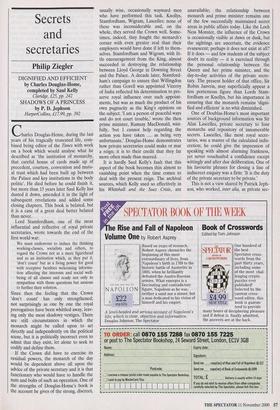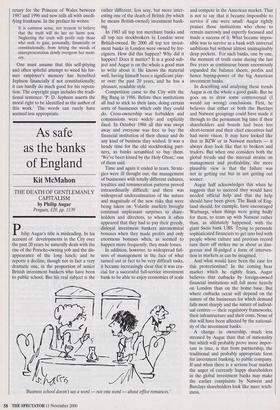Secrets and secretaries
Philip Ziegler
harles Douglas-Home, during the last years of his tragically truncated life, com- bined being editor of the Times with work on a book which would analyse what he described as 'the institution of monarchy, that careful house of cards made up of precedent, courtesy, convention and mutu- al trust which had been built up between the Palace and key institutions in the body politic'. He died before he could finish it, but more than 15 years later Saul Kelly has dusted it down, amended it in the light of subsequent revelations and added some closing chapters. This book is belated, but it is a case of a great deal better belated than never.
Lord Stamfordham, one of the most influential and reflective of royal private secretaries, wrote towards the end of the first world war: We must endeavour to induce the thinking working-classes, socialists and others, to regard the Crown not as a mere figurehead and as an institution which, as they put it, `don't count' but as a living power for good with receptive faculties welcoming informa- tion affecting the interests and social well- being of all classes and ready not only to sympathise with those questions but anxious to further their solution.
Since then the feeling that the Crown `don't count' has only strengthened; not surprisingly as one by one the royal prerogatives have been whittled away, leav- ing only the most shadowy vestiges. There are still circumstances in which the monarch might be called upon to act directly and independently on the political scene, but it is politically incorrect even to admit that they exist, let alone to seek to codify and define them.
If the Crown did have to exercise its residual powers, the monarch of the day would be dependent above all upon the advice of the private secretary and it is that functionary who would have to handle the nuts and bolts of such an operation. One of the strengths of Douglas-Home's book is the account he gives of the strong, discreet, usually wise, occasionally wayward men who have performed this task. Knollys, Stamfordham, Wigram, Lascelles: none of these was inconsiderable and, on the whole, they served the Crown well. Some- times, indeed, they fought the monarch's corner with even greater zeal than their employers would have done if left to them- selves. Stamfordham and Wigram, with lit- tle encouragement from the King, almost succeeded in destroying the relationship between Lloyd George in Downing Street and the Palace. A decade later, Stamford- ham's campaign to ensure that Willingdon rather than Gorell was appointed Viceroy of India reflected his determination to pre- serve royal influence over such appoint- ments, but was as much the product of his own pugnacity as the King's opinions on the subject. 'I am a person of peaceful ways and do not court trouble,' wrote the then prime minister, Ramsay MacDonald, wist- fully, 'but I cannot help regarding the action you have taken ... as being very unfortunate.' Douglas-Home demonstrates how private secretaries could make or mar a reign; it is to their credit that they far more often made than marred.
It is hardly Saul Kelly's fault that this aspect of the book becomes thin almost to vanishing point when the time comes to deal with the present reign. The archival sources, which Kelly used so effectively in his Whitehall and the Suez Crisis, are unavailable; the relationship between monarch and prime minister remains one of the few successfully maintained secret areas in public affairs today. Like the Loch Ness Monster, the influence of the Crown is occasionally visible at dawn or dusk, but the sightings are uncertain, the evidence evanescent; perhaps it does not exist at all? If it does — and few students of the subject doubt its reality — it is exercised through the personal relationship between the Queen and her prime minister, and the day-to-day activities of the private secre- tary. The present holder of that office, Sir Robin Janvrin, may superficially appear a less portentous figure than Lords Stam- fordham or Knollys, but his importance in ensuring that the monarch remains 'digni- fied and efficient' is no whit diminished.
One of Doublas-Home's most important sources of background information was Sir Alan Lascelles, private secretary to four monarchs and repository of innumerable secrets. Lascelles, like most royal secre- taries, was a master of the calculated indis- cretion; he could give the impression of speaking with almost alarming frankness, yet never vouchsafed a confidence except wittingly and after due deliberation. One of his favourite phrases for closing a line of indiscreet enquiry was a firm: 'It is the duty of the private secretary to be private.'
This is not a view shared by Patrick Jeph- son, who worked, inter alia, as private sec- retary for the Princess of Wales between 1987 and 1996 and now tells all with unedi- fying frankness. In the preface he writes:
It is common sense, not treason to believe that the truth will do her no harm now. Neglecting the truth will profit only those who seek to gain, personally, financially or constitutionally, from letting the weeds of misrepresentation slowly overgrow her mem- ory.
One must assume that this self-pitying and often spiteful attempt to weed his for- mer employer's memory has benefited Jephson financially if not constitutionally; it can hardly do much good for his reputa- tion. The copyright page includes the tradi- tional sentence: 'P. D. Jephson asserts the moral right to be identified as the author of this work.' The words can rarely have seemed less appropriate.



























































































 Previous page
Previous page